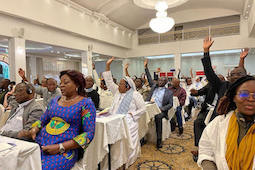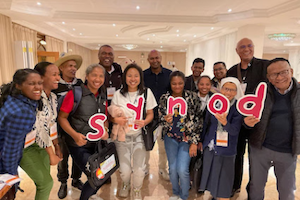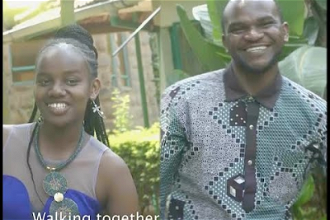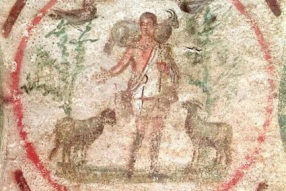Voices from second week of African Synod

Good governance, reconciliation, emigration, care for the mentally ill, ethnicity and youth were among issues raised by participants at meetings of the Africa Synod that is completing its second week in the Vatican. A selection of summaries follow:
Cardinal John Njue, Archbishop of Nairobi ,President of the Kenya Episcopal Conference
Africa continues to thirst for Good Governance. Many countries in Africa continue to struggle under bad governance where unchecked hunger for power has led to impunity, corruption, manipulation of people and other similar social political evils bled from human hearts in need of conversion. The church in Kenya and elsewhere in Africa has continued to
struggle to bring on board systems of governance that address justice through service to the common good. Pastoral letters have continually addressed bad governance which by and large can be termed the cancer of Africa. This is what has impoverished the people across the continent.
Many people are downtrodden and need to urgently experience the assurance of Christ ... 'the spirit of the lord is upon me ... he has sent me to bring the good news to the poor ... to set the down trodden free' Lk 4:17-21.
These downtrodden people must be invited to participate in the construction of just systems of governance through making good constitutions. The constitution in Kenya and those elsewhere in Africa require overhaul if they have to address bad governance, human rights, reconciliation and peace process that can only be brought about by just systems.
What is clear in Kenya and the larger Africa is that some leaders would rather stick to constitutions that give them unchecked power leading to anarchy and dictatorship. The post- election violence in Kenya in 2008 is a good example of impunity. The National Accord that was reached giving birth to the Grand Coalition Government was a great relief to Kenyans whose brethren had died in masses and others becoming refugees in their own country. Despite this the reforms proposed as the permanent solution to the socio-political problems, are yet to be implemented. The trial of perpetrators of the post election violence is yet to begin.
The church in Kenya continues to stress the urgency of reforms through good systems of justice. The Catholic Church continues to intensify Civic Education to empower citizens on their rights and duties. This empowerment is a need all over Africa depending on the issues in a given country. Consequently it is urgent:
To have a formation programme for people in government, to form good and holy politicians as agents of good governance, to provide chaplaincies for politicians, to strengthen Catholic Media to enhance moral formation for all, to enhance the prophetic role of the church everywhere, to aggressively attend to the ongoing formation of all agents of evangelization including politicians based on sound Catechism and the Social Teachings of the Church.
This Synod gives us a special opportunity to reflect on the cancer that is eating up our Continent and a cure must be found. Good Governance is not only a priority but a must. I can as well add that politics in Africa is so important that we cannot leave it to politicians alone at the risks we have already experienced. The time to act constructively is now!
Archbishop Joseph Edra Ukpo of Calabar, Nigeria.
Sustainable reconciliation prevents the use of the past as the seed of renewed conflict. It consolidates peace, breaks the cycle of violence and strengthens newly established or reintroduced democratic institutions. As a backward-looking operation, reconciliation brings about the personal healing of survivors, the reparation of past injustices, the building or rebuilding of non-violent relationships between individuals and communities, and the acceptance by the parties to a conflict of a common vision and understanding of the past. In practice such all-encompassing reconciliation is not easy to realize. The experience of a brutal past makes the search for peaceful coexistence a delicate and intricate operation.
The Church in Africa must continue to engage other religions in dialogue, involve the media, schools and civil society;
Actively participate in the Truth and Reconciliation Commissions. Those set up by Governments only cool off tempers but do not bring about sustainable reconciliation. We should deepen efforts to heal wounds both spiritually and improve community lite.
Seminars on The Church's Social Teachings should be organized for Town Hall meetings, in the schools and for politicians irrespective of their parties.
By healing memories and using them to provide early warning signals, teaching future generations how to identify the first signs of renewed and potentially dangerous distrust. By providing education for conflict resolution and transformation, peace and reconciliation-related education and training program.
By Intensifying Prison Apostolate and resettlement far ex-prisoners. By facilitating opportunities by which communities emerging from conflict can share their experiences and learn from others who have tackled similar issues. By encouraging and supporting education ministries to analyze and examine how education systems need to change and expand in order to promote sustainable peace.
Menghisteab Tesfamariam, Eparch of Asmara, Eritrea
The woes and tribulations afflicting most of the African Continent, namely, the ongoing conflicts, injustices, human rights violations, lack of religious freedom, persecutions, exploitation of human and natural resources, different kind of diseases, poverty, unemployment, displacement, brain drain and human trafficking, are sufficiently know and publicized. These, and I speak from experience, are caused by internal and external forces of hunger for power and an unrestrained greed for possessions.
The family as the first and smallest nucleus of any society and Christian community is the first and indispensable school of Reconciliation, Justice and Peace. For it is in the family that one learns the sense of belonging and identity, and the values of solidarity, sharing, respect for others, hospitality, togetherness, etc.
It is true that the largest number of refugees and displaced people is found in Africa. It is also true that many Africans are still trying to cross deserts and seas in order to reach lands where they think they will get better education, more money, and especially greater freedom. There is great need of pastoral care for these vulnerable groups of people. Our Synod must urge that the Churches of origin and the Churches who host them need to have much closer collaboration.
However, emigration of Africans has not started recently. There are now many Africans who have successfully established themselves in the developed world. If motivated by us, they are ready to make their contribution towards the improvement of life in their countries of origin. We must not exclude them from being involved in developing Africa's potentials. In close collaboration with our sister Churches in Europe, America and Australia we have to bring them aboard in the efforts to move Africa forward, both humanly and spiritually.
If the African Family and the Africans in Diaspora are going to help the Church become 'salt of the earth and Light of the world' then we have to make sure that a very effective basic and on-going formation is given to all our Pastoral agents. Especially in this Year of the Priesthood it is vital that all the members of the Presbyteriate be fully aware of their call to become holy ministers of reconciliation, credible advocates of justice and faithful bearers of Christ's peace.
Brother André Sene, responsible for the Pastoral of Health in the Diocese of Thies, Senegal.
The lack of interest of the international community and our countries in particular in the fate of these especially repugnant sick persons cannot disguise the evident proof, following the example of the worldwide studies on mental health, that the prevalence of mental illness is very high in many countries in development.
Up until this time when I speak to you and to my knowledge there is no financial program by international organizations or national for mental health.
According to the OMS, mental illnesses are placed third among illnesses in terms of prevalence and are responsible for one-fourth of handicaps. Where are the mentally ill?
In the streets of most of our cities, it is impossible to walk through our cities without meeting a mentally ill person.
The African cultures in a general way still find difficulty in erasing confusion: mentally ill equals possessed. Often nobody knows of their existence, they are a family’s embarrassment and most cases remain hidden. Our cultures must be healed of this ignorance.
The serious weaknesses that Africa knows in this domain, without a doubt accentuated by poverty and conflicts, presents the Church-Family of God in Africa with a challenge to inscribe the socio-sanitary dimension into her agenda in the exercise of faith to continue to denounce indifference of our governments with regard to the respect and care for the mentally ill and to persons addicted to drugs.
The sick must be healed and wounds of those who think they have lost everything must be dressed, wounds that unfortunately will take a long time to heal. However, above all there is a need for prevention.
Archbishop Norbert Wendelin Mtega of Songea, Tanzania.
Many of our people are tortured, harassed and assassinated simply due to unfounded malicious suspicions fomented by sorcery and witchdoctors. There are no laws to defend them, governments do condone, some leaders do conspire with the witchdoctors, some governments do legalize. Many leaders do believe in sorcery, superstition and occultism. We need; deeper evangelisation, advocacy and prophetic voice to our governments.
The survival of our farmers is precarious. Often their plight does not feature in the budgets of our governments and very often they are cheated. The Church in Africa must fight for farmers and pastoralists: That they must get their right share in the Budget that basic infrastructures and basic needs for their work and products are guaranteed, that arrangements be made for stable and good markets, that internal markets be protected, and that they be initiated to saving and lending micro-finance cooperatives.
For our politicians peace means `a quiet atmosphere which allows them to rob and enjoy the money of their countries'. For them, free and fair elections means ` success to bring people to the polls in total ignorance of their inherent rights' and of the malicious maneuvers by the candidates. Politicians believe that being elected means being given the
ticket to rob the country.
We love Moslems. It is our history and culture to live with them. But the danger which threatens Africa's freedom, sovereignty, democracy and human rights is first the Islamic political factor, i.e., the intended plan and the clear process of `identifying Islam with politics and vice versa' in each of our African countries. Secondly it is the Islamic monetary factor whereby huge sums of money from outside countries is being poured in our countries to destabilize peace in our countries and to eradicate Christianity.
Ethnicity is a cancer which torments Africa. We must immediately inculcate reconciliation as our spirituality and life as well as our immediate action.
Bishop Ernesto Maguengue of Pemba, Mozambique
The main riches of the continent is represented by its population, and especially the youth, adolescents and children. Africa is a continent with the youngest population in the world.
African youth is an inestimable treasure that cannot be forgotten or lie unused, if one wishes to guarantee a future of lasting development, reconciliation, justice and peace in Africa.
Many young persons are led into violence, prostitution, drug trafficking and use, organized crime, political, ethnic and tribal strife, as well as into religious fundamentalism and satanic sects among others.
In the light of all these, we would like to suggest: A strong message of trust and encouragement from the Synodal Assembly to youth, adolescents and children as the main players at the service of reconciliation, justice and peace.
Denounce as one of the more obvious injustices marginalization, manipulation, exploitation and violation of children’s rights.
The need for deeper studies on the question of African youth, using the humanistic sciences to see which are the most pressing problems and to find effective solutions to them.
Pastoral strategies of the church and government policies must be conceived keeping youth in mind, so that not only their material needs are satisfied, but also their spiritual ones.
The challenge to the Church, government and African society in general in finding ways to stimulate and take advantage of the vast potential which African youth represents.
I would like to underline the need for education and integral formation of youth that takes into consideration the context and their culture so as to make them able to be true servants of reconciliation, justice and peace.
Look over the contents and methods of catechesis, as well as the respective charisms, especially the catechumenate to include the social doctrine of the Church, a formation of critical consciousness, love of life, respecting and protecting nature.
The urgency for pastoral care, due to the fact that the majority of children and adolescents grew up in difficult environments characterized by destroyed families, hostilities, wars, violence and abuses of fundamental rights which have left deep wounds in the souls.
Source: CISA





















